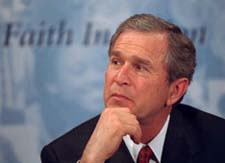
|
In February of this year, President Bush announced that Sens. Joseph Lieberman (D-CONN.) and Rick Santorum (R-PA.), who he had asked to shepherd compromise legislation through the Senate, had come up with a proposal. While the Senators may be on opposite sides of a number of political issues, the legislation they are currently sponsoring reflects the fact that both believe that the government should support and encourage faith-based institutions. They also share a lesser-known relationship: They serve as Empowerment Caucus Chairmen for a conservative organization called The Empowerment Network (TEN). TEN, which was founded in 1992, describes itself as "a resource hub for state legislators, grassroots organizations, and other civic leaders promoting American family and community renewal of civil society in the 21st century." According to its website, its "grassroots network provides the winning edge on policy initiatives that support youth character and family revitalization, entrepreneurship and the unleashing of faith-based initiatives and cultural remedies." Is The Empowerment Network as nonpartisan as they sound? Judging from the list of founders - many of whom are seasoned conservative ideologues - they aren't. The founders include:
According to OMB Watch, the "Charity Aid, Recovery and Empowerment Act of 2002" (CARE Act - S. 1924) would "create new incentives for charitable giving and specify equal treatment of faith-based and secular nonprofits when applying for federal grants." The Boston Globe's Mary Leonard and Sue Kirchhoff write that instead of helping the poor, the "Charity Aid, Recovery and Empowerment Act of 2002" (CARE), "could emerge from Congress…as a fund-raising boon worth billions of dollars to colleges and a big tax benefit to Americans with large nest eggs." Senate legislation, they write, "would provide a $2.9 billion tax break to people who make donations from Individual Retirement Accounts to nonprofit institutions, a benefit potentially so large, college officials say they have been seeking it for more than five years." The CARE Act is a big step toward Bush's vision of the unleashing "armies of compassion" on social problems. CARE also further erodes the lines between church and state. Will CARE's tax credits and tax breaks for the wealthy translate into help for the poor and needy? Doug O'Brien, director of public policy for Second Harvest in Chicago, the nation's largest hunger relief organization isn't sure that it will. ''Our primary objective is not cash donations, our primary objective is we need more food, and we need quality food," he told the Boston Globe. From Fanfare to Flubs From the very outset - the January 2001 highly-publicized introduction of the president's faith-based initiative - civil liberties organizations and gay rights groups were concerned that it violated the separation of church and state. The initiative's "charitable choice" provision invited religious groups to continue discriminatory hiring practices against gays and lesbians. The National Gay and Lesbian Task Force's Policy Institute report, Leaving Our Children Behind: Welfare Reform and the Gay, Lesbian, Bisexual and Transgender Community described "charitable choice" as the massive "transfer of tax dollars to religious institutions…[that] often would come with no demand for fiscal accountability, no requirement that religious institutions not discriminate, and no safeguard against recipients of social services being subjected to proselytizing and other forms of coercive activity." Religious right leaders, including the Rev. Jerry Falwell and Pat Robertson, were concerned organizations like the Church of Scientology, the Nation of Islam and the Society of Krishna Consciousness would receive government funding. Passing a faith-based bill was hamstrung by a series of problems:
The Hudson Institute's Michael Horowitz, a longtime conservative activist, captured the conservative view telling the Washington Post DiIulio had been "the most strategically disastrous appointee to a senior government position in the 20-plus years I've been in Washington. He has taken what could have been a triumphant issue and marched it smack into quicksand." In early February, the relatively unknown Jim Towey was named director of the OFBCI and the agency was placed under the umbrella of the newly created USA Freedom Corps.
Shepherded by the soon-to-be-retired Rep. J.C. Watts (R-OK.), the bill contained a number of thorny issues including the "charitable choice" provision. House Speaker Dennis Hastert suggested those issues would be better left for the Senate to decide. Judicial Setbacks In early-January 2002, Judge Barbara B. Crabb of the U.S. District Court in Western Wisconsin ruled that Faith Works, "indoctrinates its participants in religion, primarily through its counselors." Faith Works, a residential program that helps poor men deal with addiction, education, jobs, and facilitate reconnecting with their families, received more than $900,000 from the Wisconsin Department of Workforce Development (DWD) and other government and private sources. Judge Crabb found that the DWD funding "constitutes unrestricted, direct funding of an organization that engages in religious indoctrination" in violation of the establishment clause. She ordered an end to the use of DWD funding for Faith Works. More recently, U.S. District Judge G. Thomas Porteous Jr. ordered Louisiana "to stop giving money to individuals or organizations that 'convey religious messages or otherwise advance religion' with tax dollars," according to the Washington Post. The ruling stemmed from evidence that "many of the groups participating in the Governor's Program on Abstinence were 'furthering religious objectives.'" The judge found that programs established by Gov. Mike Foster had used "government money to distribute Bibles, stage prayer rallies outside clinics that provide abortions and perform skits with characters that preach Christianity violat[ing] the Constitution's separation of church and state." Bush's Faith-Based Team Pushes Forward Despite these setbacks, the Bush Administration's faith-based team was moving ahead on a number of fronts. The administration established Centers for Faith-Based and Community Initiatives in five cabinet agencies - Health and Human Services, Housing and Urban Development, Justice, Education and Labor - "to promote the administration's faith-based and community agenda by changing how the federal government operates" boasts the White House website http://www.whitehouse.gov/infocus/faith-based/ According to the website: "These Centers will evaluate policies, funding programs, and agency communications and technical assistance strategies to ensure that they emphasize effectiveness and hospitality to faith-based and community-based organizations." The administration was creating a serviceable infrastructure staffed by longtime veterans of the so-called family values movement. During the past few months, the Centers have announced several new funding initiatives:
Said Labor spokeswoman Emily DeRocco: "We understand that employment results in strong families and stable communities. This is a goal we share with faith-based organizations, so this is a program we want to continue nationwide" (Focus on the Family News). "An Education Department team is quietly traveling the country helping religious groups compete for more than $1 billion in federal grants for afterschool and tutoring programs," reported the Associated Press in late-July. John J. Porter, who heads the department's Center for Faith-Based and Community Initiatives told the AP that he had met with "these armies of compassion and I hear their stories. I hear about the work they're doing in these cities and in these troubled areas - it's almost like this huge cry for help is going up." Last year's passage of Bush's Education bill allowed for $1.25 billion in federal aid for afterschool programs and millions more for tutoring services to schools, businesses and community-based organizations. According to the AP, "As far as Bush is concerned, that includes churches and other religious organizations, though that's not spelled out in the law." While the administration has not succeeded in implementing the full scope of his faith-based agenda, it has done remarkably well on several fronts: It has established a highly productive multi-agency faith-based team that is moving the issue forward; it is successfully funneling money to faith-based groups; and it has succeeded in bringing the term "faith-based organizations" squarely into the middle of national debate over how best to deal with the country's deeply-rooted social problems. |
 George W. Bush's 'faith-based initiative' has not gone far in the 18 months since it was proposed, but still his administration is finding ways to fund religious organizations
George W. Bush's 'faith-based initiative' has not gone far in the 18 months since it was proposed, but still his administration is finding ways to fund religious organizations  Sen. George Allen of Virginia is one of the founders of the Empowerment Network
Sen. George Allen of Virginia is one of the founders of the Empowerment Network 
 HHS Secretary Tommy G. Thompson
HHS Secretary Tommy G. Thompson